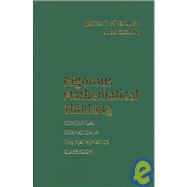
Note: Supplemental materials are not guaranteed with Rental or Used book purchases.
Purchase Benefits
Looking to rent a book? Rent Rigorous Mathematical Thinking: Conceptual Formation in the Mathematics Classroom [ISBN: 9780521876858] for the semester, quarter, and short term or search our site for other textbooks by James T. Kinard , Alex Kozulin. Renting a textbook can save you up to 90% from the cost of buying.
| Introduction | p. 1 |
| Culture of Mathematics | p. 16 |
| Goals and Objectives of Mathematics Education | p. 35 |
| Vygotsky's Sociocultural Theory and Mathematics Learning | p. 50 |
| Mediated Learning and Cognitive Functions | p. 73 |
| Mathematical Concept Formation and Cognitive Tools | p. 107 |
| RMT Application, Assessment, and Evaluation | p. 159 |
| Conclusion | p. 193 |
| References | p. 197 |
| Index | p. 205 |
| Table of Contents provided by Ingram. All Rights Reserved. |
The New copy of this book will include any supplemental materials advertised. Please check the title of the book to determine if it should include any access cards, study guides, lab manuals, CDs, etc.
The Used, Rental and eBook copies of this book are not guaranteed to include any supplemental materials. Typically, only the book itself is included. This is true even if the title states it includes any access cards, study guides, lab manuals, CDs, etc.